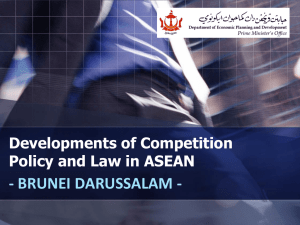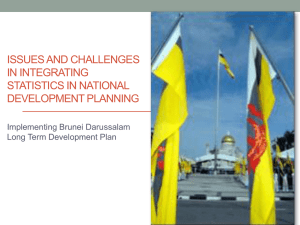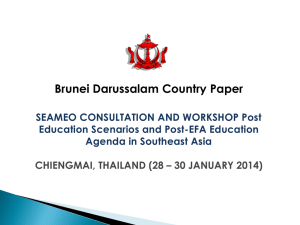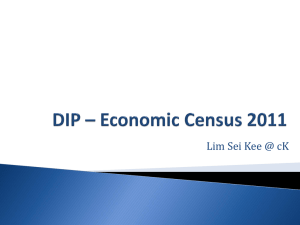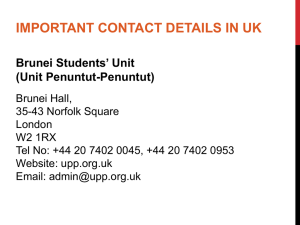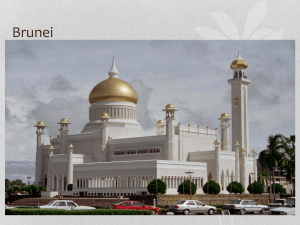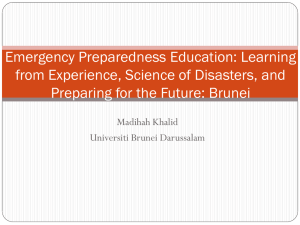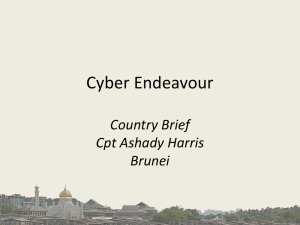PPT
advertisement
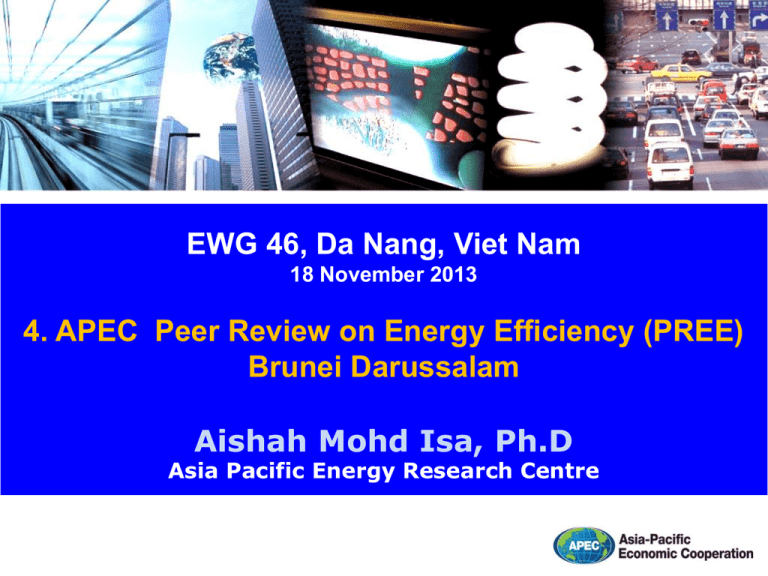
EWG 46, Da Nang, Viet Nam 18 November 2013 4. APEC Peer Review on Energy Efficiency (PREE) Brunei Darussalam Aishah Mohd Isa, Ph.D Asia Pacific Energy Research Centre Presentation Outline Overview of EE&C in Brunei Darussalam • Brunei Darussalam in brief • EE&C Institutional Framework • EE&C Key Policies PREE in Brunei Darussalam • • • • PREE Process for Brunei Darussalam Key Findings Some Recommendations Photos 2 Overview of EE&C Measures in Brunei Darussalam 3 Brunei Darussalam in brief Total Final Energy Consumption (2012): 1012 ktoe Facts and Figures Brunei (2011) Area 5765 km2 Population 393,372 Income per capita BND 52,315/capita (USD 42264/capita) Energy per capita 2.5 toe/capita Electricity consumption per capita 8,300 kWh per capita (2008) CO2 emissions per capita 19.1 kg CO2/capita Other Sectors 30% Industry 25% Transport 45% Source: Brunei Background Review for PREE Phase 4 4 EE&C Institutions in Brunei Darussalam National Energy Efficiency and Conservation Committee (NEECC) Energy Department, Prime Minister’s Office Energy Efficiency and Conservation (EEC) Unit Department of Electrical Services (DES) Strategic, Planning, Economic and Intelligence (SPEI) Other Ministries Other Institutions Ministry of Development Brunei National Energy Research Institute (BNERI) Ministry of Communications Ministry of Education Universiti Brunei Darussalam Ministry of Finance 5 8 Key EE&C Policies in Brunei Darussalam EDPMO Ministry of Education Appliance Standards Awareness Raising Labelling EDPMO EDPMO Financial Incentives EE&C Roadmap Building Regulation EDPMO Electricity Tariff Reform Ministry of Communications Energy Management Fuel Economy Regulation Ministry of Development EDPMO Source: Brunei Energy Efficiency and Conservation Study: Roadmap Formulation and Policy Advice 6 PREE in Brunei Darussalam 11-15 June 2013 7 PREE Process for Brunei Darussalam Brunei accepted to host PREE EWG Members endorsed PREE Brunei 18-22 March 2013 at EWG45 APERC sent Draft Review Report to Brunei • The 1st Draft: 10 October 2013 • The 2nd Draft: 25 October 2013 APERC and Brunei formed PREE Review Team Brunei submitted background information 14 May 2013 10 May 2013 PREE Review Team completed Preliminary Report PREE Review Team visited Brunei 31 August 2013 11-15 June 2013 Final Draft Report signed-off by Brunei PREE Brunei results presented at EGEE&C 42 PREE Brunei endorsement at EWG 46 7 November 2013 12 November2013 at EGEE&C 42 18-21 Nov 2013 at EWG46? 8 PREE Brunei Darussalam Key Findings • Brunei Darussalam has high GDP per capita and is energy selfsufficient; likely to remain an energy exporter beyond 2035. • Then, why have EE&C? • Extremely high energy consumption per capita. • To avoid the environmental costs of energy wastage. • Allows more oil and gas to become available for exports, this will increase or prolong export revenues. • Brunei Darussalam has already identified key policy options that should be implemented in order to achieve the goal of 45% reduction in energy intensity by 2035 (using 2005 as the base line). • Energy efficiency initiatives face substantial barriers due to the current energy pricing mechanism, which in the long-run may not be sustainable. 9 PREE Brunei Darussalam Recommendations The PREE Review Team made 47 recommendations PREE recommendations are tailored towards: • aligning and prioritizing policy options under a unified framework • sharing innovative EEC approaches that are suitable for Brunei Darussalam • • 4 Institutional Context Energy Efficiency Goals, Targets and Strategy 3 4 Energy Data Collection and Monitoring Policy Measures - Residential, Commercial, Government and Industrial Sectors 15 7 9 Policy Measures – Transport Sector Policy Measures – Electricity Sector 5 Policy Measures – Appliances and Equipment 10 PREE Brunei Darussalam Recommendations - Getting the right information Recommendation 8: Define a structured energy efficiency data collection framework and ensure regular implementation. Recommendation 27: Continue developing a database of fuel efficiency of light vehicles in the Brunei Darussalam fleet to be the basis on which vehicle fuel efficiency policies and initiatives, including consumer information, can be designed and monitored. Recommendation 31: Continue to periodically survey daily vehicle usage patterns (range of trip distances, range of daily driving distances and trip purpose) to increase understanding of travel patterns to assist in the design of future policies and initiatives. 11 PREE Brunei Darussalam Recommendations - Sending the right message Recommendation 4: The Government of Brunei Darussalam should consider implementing gradual energy pricing reforms which draws on successful approaches used in other countries. Recommendation 10: Publish energy efficiency indicators monitoring reports periodically to evaluate progress and encourage continuing efforts in energy efficiency improvements. Recommendation 12: Brunei Darussalam should conduct a detailed market research to identify which EEC messages would appeal the most to different consumer groups. Recommendation 19: Appropriate incentives should be designed to motivate facility managers and operators, particularly those in governmentowned facilities, to apply EEC improvements that minimize operation costs. Recommendation 28: Provide consumer information on vehicle fuel consumption through the implementation of a vehicle labelling programme and energy efficient driver behaviour. 12 PREE Brunei Darussalam Recommendations - Building local capacity to manage EEC issues Recommendation 13: School Energy Clubs should be enhanced by developing an energy efficiency curriculum to reach all students in all levels of education. Recommendation 18: In support of the energy management law, a sufficient number of qualified external auditors should be trained to conduct monitoring and verification exercises to ensure compliance. Recommendation 23: Build local capacity for addressing the EEC elements of the Building Code. 13 PREE Brunei Darussalam Recommendations - Applying innovative technologies Recommendation 5: Identify appropriate incentives to further enhance EEC measures. (For example by applying the Opower Home Energy Report as social incentive for saving energy). Recommendation 32: Investigate information technology based, demand responsive transit models which may be more suitable to Brunei Darussalam’s population size and urban density than traditional fixedroute public transport and better meet customers’ needs. Recommendation 38: Consider using other innovative tariffs such as “time of use (TOU) tariffs” to encourage consumers to increase their use of energy efficiency and lower overall system consumption. Recommendation 42: As part of the efforts to supply electricity to the eco-tourism Temburong area, conduct a feasibility study that applies intensive energy efficiency measures integrating small-scale renewable energy supply (keeping the diesel generation facility as a back-up if needed). 14 PREE Brunei Darussalam Recommendations - Applying innovative technologies ( R5)- 15 Photos from PREE Review Team Visit Site Visit to Bukit Panggal CCGT Power Station Meeting with Minister for Energy Visit to BNERI and UBD PREE Review Team and Ministry Officials 16 Thank you for your kind attention http://aperc.ieej.or.jp 17
